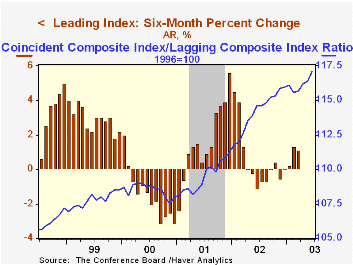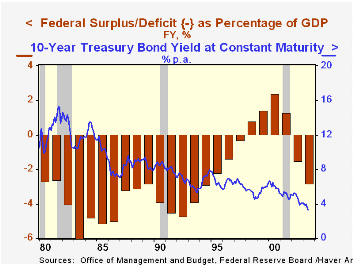 Global| Jul 21 2003
Global| Jul 21 2003Leading Indicators Up
by:Tom Moeller
|in:Economy in Brief
Summary
The Conference Board reported that the Composite Index of Leading Economic Indicators rose for the third consecutive month in June. The 0.1% gain was as expected and the prior month's increase was revised up slightly. Gains amongst [...]

The Conference Board reported that the Composite Index of Leading Economic Indicators rose for the third consecutive month in June. The 0.1% gain was as expected and the prior month's increase was revised up slightly.
Gains amongst the leaders' component series fell back to a still-high 55% from the 80% breadth of gain in May. The percentage of leading components rising over a six month period dropped to 30% from 50% in the prior two months.
A higher money supply and higher stock prices had large positive influences on theJune leading index. These were offset by negative influences from a narrower yield curve and lower consumer expectations.
The Leading index is based on eight previously reported economic data series and two that are estimated.
The coincident indicators rose slightly for the second month.
The ratio of coincident-to-lagging indicators surged 0.6%, again to a new high. The ratio is an indicator of excess relative to actual economic performance.
Visit the Conference Board's site for coverage of leading indicator series from around the world.
| Business Cycle Indicators | June | May | Y/Y | 2002 | 2001 | 2000 |
|---|---|---|---|---|---|---|
| Leading | 0.1% | 1.1% | 0.5% | 2.1% | -0.9% | 1.0% |
| Coincident | 0.1% | 0.1% | 0.1% | -0.2% | -0.4% | 3.4% |
| Lagging | -0.5% | -0.1% | -2.0% | -4.4% | -1.3% | 2.8% |
by Tom Moeller July 21, 2003

The U.S. Government budget was in surplus last month by $21.2B. The surplus was about as expected by most analysts but it was the smallest surplus for the month of June since 1995.
The Federal government's deficit totaled $270.5B through the first nine months of this fiscal year. That is versus a deficit of $116.3B through the first nine months of FY2002.
The latest update of the outlook for the US Budget from the Office of Management & Budget is available here.
Net receipts for the first nine months of FY03 fell 3.5% versus last year. Individual tax payments fell 6.0% and corporate income taxes were down 15.8%. Social insurance contributions rose a small 1.7% but excise taxes fell slightly.
Federal net expenditures rose 6.9% versus last fiscal year's first nine months led by higher defense spending which rose 15.7%. Spending on health programs also was strong, up 10.5%. Spending on education surged 17.3%. Spending on income security rose 8.8% while Medicare outlays rose 8.8%. Social Security outlays rose just 4.1% and interest expense fell 8.1% y/y.
| US Government Finance | June | May | June '02 | FY2002 | FY2001 | FY2000 |
|---|---|---|---|---|---|---|
| Budget Balance | $21.2B | $-90.0B | $29.1B | $-157.8B | $127.3B | $236.4B |
| Revenues | $193.1B | $103.4B | 5.7% | -6.9% | -1.7% | 10.8% |
| Outlays | $171.9B | $193.5B | 11.9% | 7.9% | 4.2% | 5.1% |
Tom Moeller
AuthorMore in Author Profile »Prior to joining Haver Analytics in 2000, Mr. Moeller worked as the Economist at Chancellor Capital Management from 1985 to 1999. There, he developed comprehensive economic forecasts and interpreted economic data for equity and fixed income portfolio managers. Also at Chancellor, Mr. Moeller worked as an equity analyst and was responsible for researching and rating companies in the economically sensitive automobile and housing industries for investment in Chancellor’s equity portfolio. Prior to joining Chancellor, Mr. Moeller was an Economist at Citibank from 1979 to 1984. He also analyzed pricing behavior in the metals industry for the Council on Wage and Price Stability in Washington, D.C. In 1999, Mr. Moeller received the award for most accurate forecast from the Forecasters' Club of New York. From 1990 to 1992 he was President of the New York Association for Business Economists. Mr. Moeller earned an M.B.A. in Finance from Fordham University, where he graduated in 1987. He holds a Bachelor of Arts in Economics from George Washington University.
More Economy in Brief
 Global| Feb 05 2026
Global| Feb 05 2026Charts of the Week: Balanced Policy, Resilient Data and AI Narratives
by:Andrew Cates






